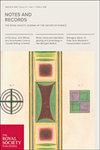Outward bound
IF 0.6
3区 哲学
Q3 HISTORY & PHILOSOPHY OF SCIENCE
Notes and Records-The Royal Society Journal of the History of Science
Pub Date : 2017-05-24
DOI:10.1098/rsnr.2017.0026
引用次数: 0
Abstract
Peter Collins, who worked as a policy officer and historian for the Royal Society for 32 years, has written an invaluable, eye-opening account of this premier organization for science, from the Tercentenary of 1960 through to the 350th anniversary of 2010. In doing so he fills a considerable gap in the historical literature. The account is meticulously sourced, drawing on Collins' unparalleled knowledge of the recent archives of the Society, as well as interviews, the memories of colleagues and the material held in external collections. But the volume is more than that. Between 1960 and 2010 the Society was led by 10 scientists—Howard Florey, Patrick Blackett, Alan Hodgkin, Alexander Todd, Andrew Huxley, George Porter, Michael Atiyah, Aaron Klug, Bob May and Martin Rees—but Collins has resisted, rightly, the temptation to organize his account as a chronology of presidents. Instead, his stated aim is ‘to analyse some key features of the Society's approach to promoting science … and thus to uncover something of its identity’ (p. xi). The chapters therefore explore these key themes and features. If we step back and look at the most significant changes in the organization's recent history, the most striking is that the Royal Society, through the years since the Second World War, has become more open, more publicly visible and more likely to take action in public than was the case, and this transformation has been partly deliberately sought but also partly thrust reluctantly upon it. Collins opens his history with a case in point. In 1945 the Society had to elect a new president. Should the president be chosen solely because he was ‘demonstrably in the very top rank of acknowledged scientific achievement’ or was it the case that, under ‘exceptional circumstances’ (p. 9), other characteristics might be necessary, such as political acuity? The …拓展训练
彼得·柯林斯(Peter Collins)在英国皇家学会担任政策官员和历史学家长达32年,从1960年的300周年纪念到2010年的350周年纪念,他对这个首屈一指的科学组织进行了宝贵的、令人大开眼界的描述。他这样做填补了历史文献中的一个相当大的空白。这本书的来源一丝不苟,借鉴了柯林斯对协会最新档案的无与伦比的了解,以及采访、同事的回忆和外部收藏的材料。但体积不止于此。1960年至2010年间,该学会由10位科学家领导——霍华德·弗洛里、帕特里克·布莱克特、艾伦·霍奇金、亚历山大·托德、安德鲁·赫胥利、乔治·波特、迈克尔·阿蒂亚、亚伦·克鲁格、鲍勃·梅和马丁·里斯——但柯林斯正确地抵制了把他的记录整理成总统年表的诱惑。相反,他声明的目标是“分析学会促进科学的方法的一些关键特征……从而揭示其身份的一些东西”(第11页)。因此,这些章节探讨了这些关键主题和特征。如果我们退后一步,看看该组织最近历史上最重大的变化,最引人注目的是,自第二次世界大战以来的这些年里,皇家学会变得更加开放,更容易在公众面前露面,更有可能在公众面前采取行动,这种转变部分是有意寻求的,部分是勉强推动的。柯林斯以一个恰当的例子开始了他的历史。1945年,协会必须选举一位新主席。是否应该仅仅因为他“在公认的科学成就方面明显处于最高水平”而选择校长,或者在“特殊情况下”(第9页),其他特征可能是必要的,比如政治敏敏性?…
本文章由计算机程序翻译,如有差异,请以英文原文为准。
求助全文
约1分钟内获得全文
求助全文
来源期刊
CiteScore
1.50
自引率
0.00%
发文量
45
审稿时长
>12 weeks
期刊介绍:
Notes and Records is an international journal which publishes original research in the history of science, technology and medicine.
In addition to publishing peer-reviewed research articles in all areas of the history of science, technology and medicine, Notes and Records welcomes other forms of contribution including: research notes elucidating recent archival discoveries (in the collections of the Royal Society and elsewhere); news of research projects and online and other resources of interest to historians; essay reviews, on material relating primarily to the history of the Royal Society; and recollections or autobiographical accounts written by Fellows and others recording important moments in science from the recent past.

 求助内容:
求助内容: 应助结果提醒方式:
应助结果提醒方式:


